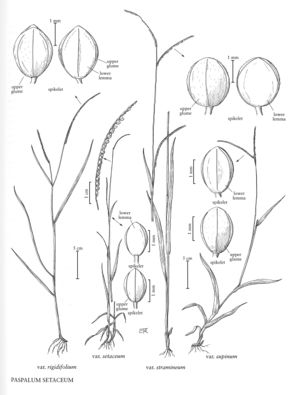Paspalum setaceum var. setaceum
Common names: Thin paspalum
Treatment appears in FNA Volume 25.
Plants erect. Leaves mostly cauline; blades to 22 cm long, 1.5-7 mm wide, lax to straight, conspicuously hirsute, usually with long stiff hairs and short soft hairs, grayish-green, margins hirsute. Panicle branches 2-11.2 cm; branch axes 0.3-0.9 mm wide. Spikelets 1.4-1.9 mm long, 1.1-1.6 mm wide, elliptic, obovate, orbicular, or suborbicular, pubescent to nearly glabrous; lower lemmas without an evident midvein; upper lemmas 1.3-2 mm.
Discussion
Paspalum setaceum var. setaceum grows in open areas and sandy soils, often at the edges of forests, primarily on the southeastern coastal plain of the United States, from southern New England to eastern Mexico, but extending inland to western Virginia, Missouri, and Arkansas. It also grows in Cuba.
Selected References
None.
Lower Taxa
None.
... more about "Paspalum setaceum var. setaceum"
Thin paspalum +
Conn. +, N.J. +, N.Y. +, Va. +, Del. +, D.C. +, Wis. +, W.Va. +, Ont. +, Fla. +, N.H. +, N.Mex. +, Tex. +, La. +, Tenn. +, N.C. +, S.C. +, Pa. +, Mass. +, R.I. +, Vt. +, Puerto Rico +, Colo. +, Md. +, Ala. +, Ark. +, Ill. +, Ga. +, Ind. +, Iowa +, Ariz. +, Kans. +, Nebr. +, Okla. +, Ohio +, Mo. +, Minn. +, Mich. +, Mont. +, Miss. +, Ky. + and S.Dak. +
Present +
Paspalum setaceum var. setaceum +
Paspalum setaceum +
variety +
